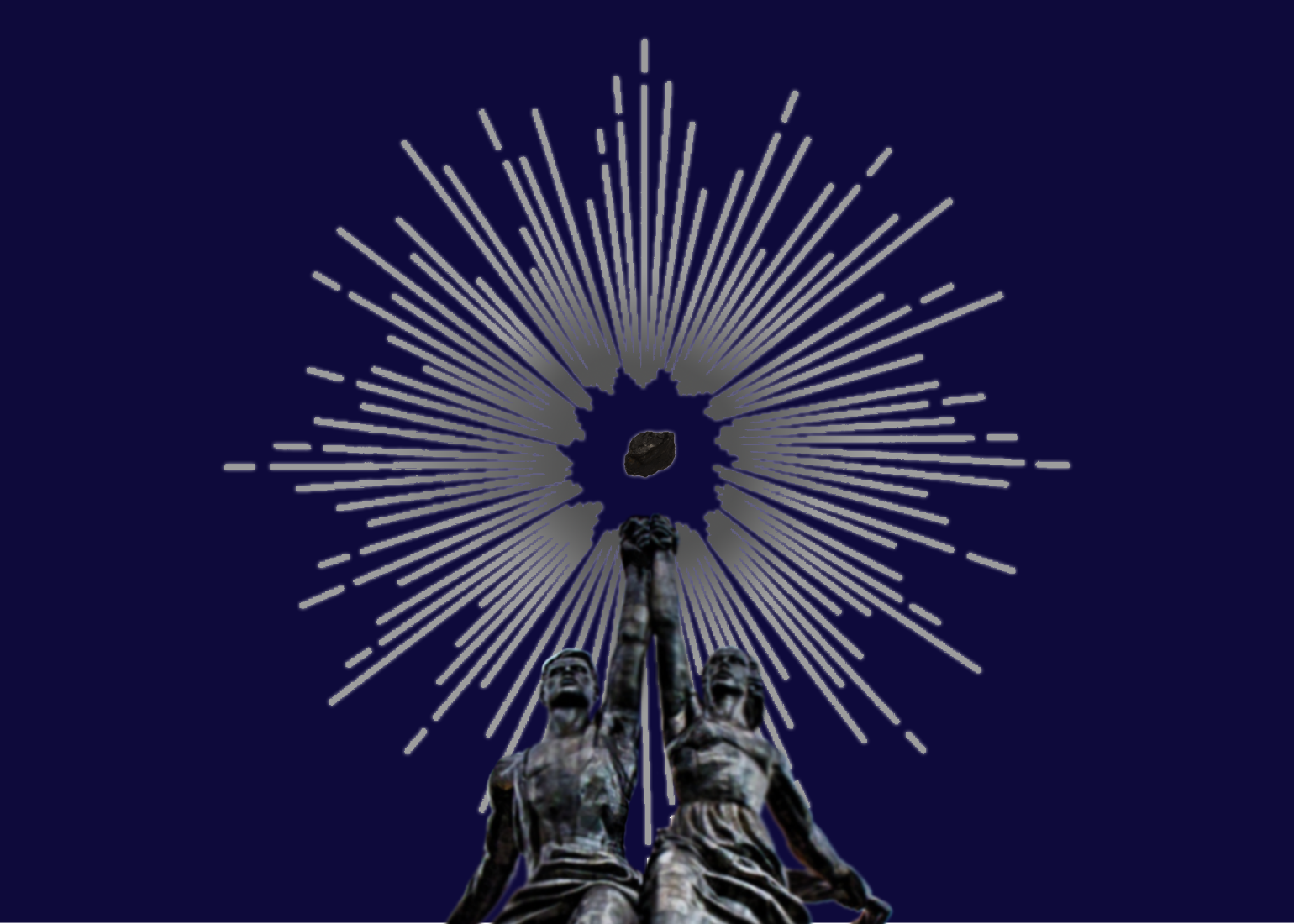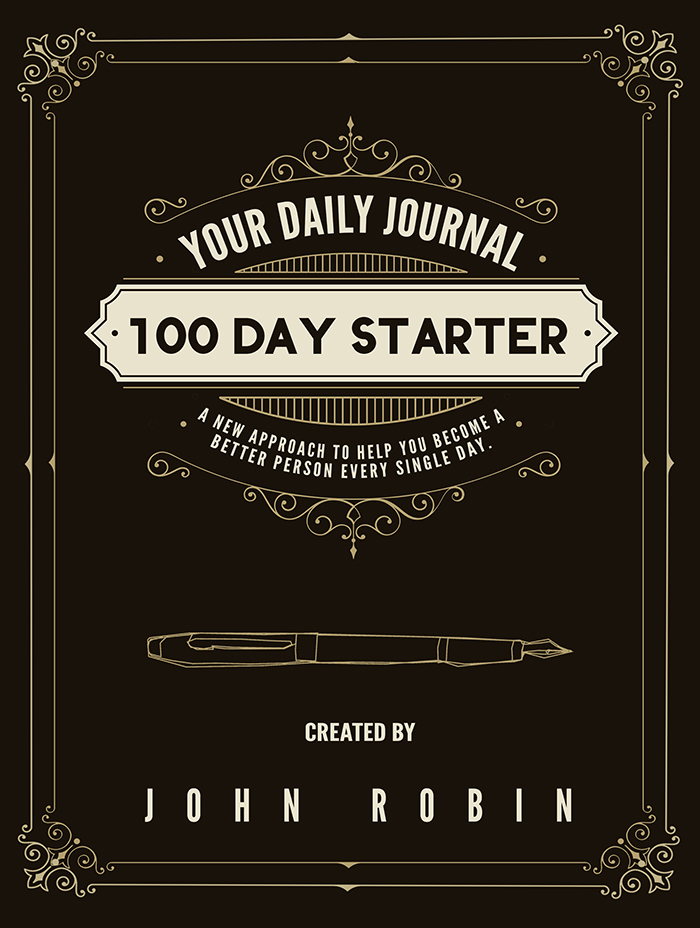Today on World Builders 2.0, we enter the world of G.K. Lamb, author of Filtered.
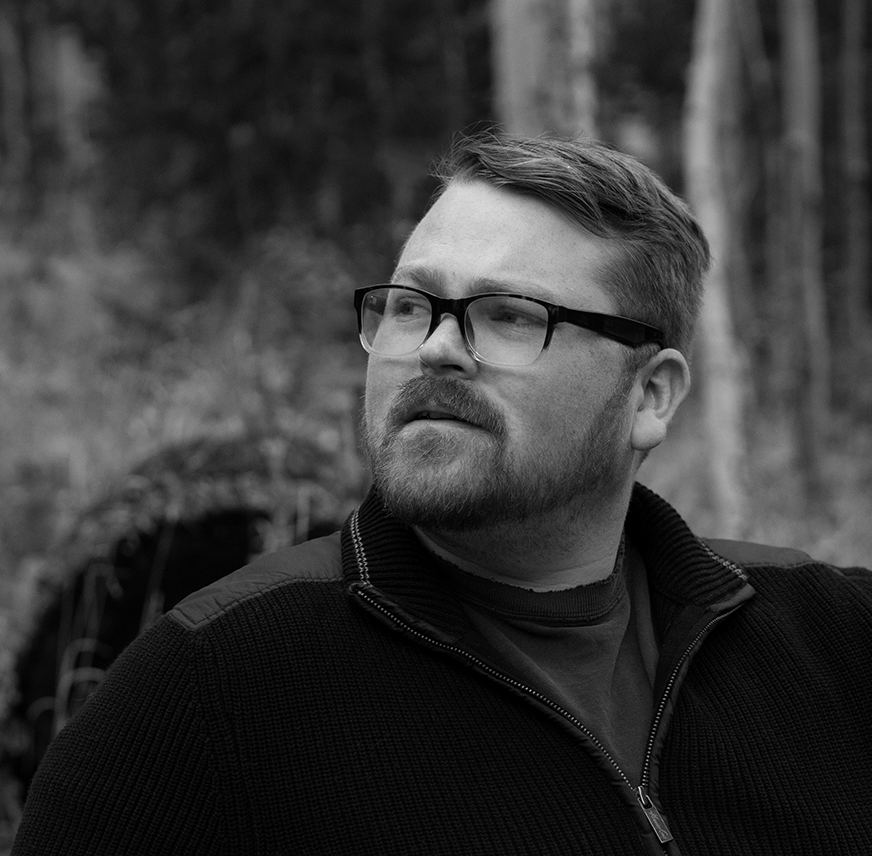 Filtered is G.K. Lamb’s debut novel. From an early age, he wanted to be a writer and follow in the footsteps of his favorite authors: Ray Bradbury, H.G. Wells, J.K. Rowling, and Lois Lowry only to name a few. With his writing he attempts to make sense of the world, to try and understand the complexities of life, the hypocrisies, narratives, and messages endlessly barraging us all. The truth, right and wrong, meaning, and acceptance are major themes that permeate his stories.
Filtered is G.K. Lamb’s debut novel. From an early age, he wanted to be a writer and follow in the footsteps of his favorite authors: Ray Bradbury, H.G. Wells, J.K. Rowling, and Lois Lowry only to name a few. With his writing he attempts to make sense of the world, to try and understand the complexities of life, the hypocrisies, narratives, and messages endlessly barraging us all. The truth, right and wrong, meaning, and acceptance are major themes that permeate his stories.
He holds a BA and MA in history from Northern Arizona University and lives amidst the pine trees in Flagstaff, Arizona. With his wife, best friend, and two cats.
Now, let us enter the world of The Great Society!
Geography and Nature: the big picture
Overall geography: When I first began writing Filtered I only saw The Great Society from Evelyn’s eyes. So for that first frantic week of typing, I became very familiar with the streets and skyscrapers of Einsam, capital city of The Great Society, but I was woefully ignorant of the larger geography. This was a strange position to be in as a writer. In the past, I have had maps and charts, whole histories, drawn up and plotted months before I write the first sentence, but Filtered was different. Evelyn came to me with a mission and I just did my best to keep up and write it all down. So after the first draft was done I began to examine her story like I would a primary source. I’m trained as a historian, so I tried to piece the history of the Great Society backwards- just like I would do for any other real history. To my advantage, Evelyn was able to experience the memories of the founder of the Great Society, so I had many of the pieces I needed to reconstruct what happened.
The world of the Great Society is roughly where the United States sits on the map today. Deviating from our timeline in the mid-nineteenth century, the economically and environmentally devastated Republic collapses into a second civil war in the aftermath of the stock market crash of 1929. Inspired by fascist-utopian ideology, Cornelius and Antonius Neptus fight a long and bloody civil war which redraws the map (with Canada and Mexico absorbing borderlands still loyal to the Republic.)
At the same time, I was incredibly influenced by the images National Geographic created to show what would happen if all the icecaps melted. In this world of exaggerated industry and failed environmental movements, I thought it would be fitting to have the shorelines reflect that worst-case-scenario. That map shows New York and Washington D.C. covered in water. With The Great Society wanting to break from the Republican past, the capital was moved from Philadelphia to Pittsburg, which is still a thriving iron city in this timeline. But I didn’t want Evelyn’s story to be about the US, because frankly it isn’t, so I made a simple twist on the name. Pittsburg, the city of steel, became Einsam a poorly translated German equivalent. So that was a really long way of saying, that the world of the Great Society is not that far from our own, just twisted and warped.
Special features that makes your world unique, exotic, or strange:
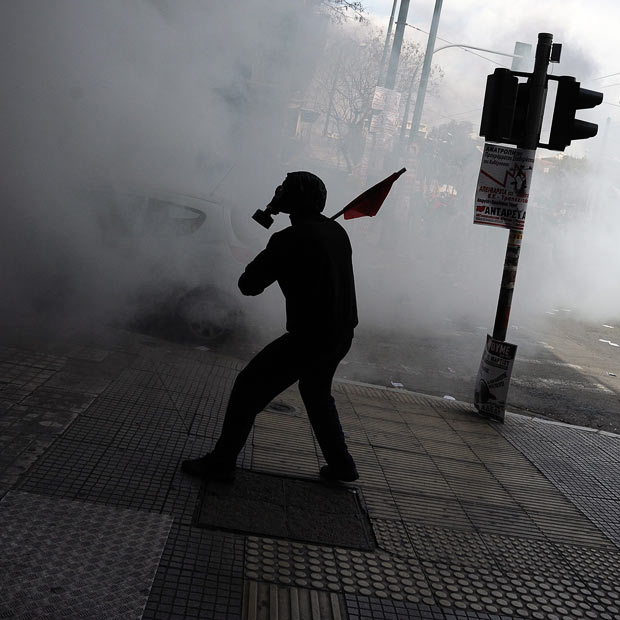 The Great Society is a world of ash and smoke. Unregulated industry forms the power and might that the Caretaker’s wield over their repressed citizens. This melding of state and industry has squashed all environmental protests and reform movements. As a result, coal is the primary energy source for heating and electricity. To live in the toxic soot-filled air, the law forces all citizens to wear gas masks while they are outside. All buildings must also be fitted with air-locks and air purification systems. The economy of the Great Society has become intrinsically linked with its pollution; nearly half of all employed citizens of the Great Society work in an industry, service, or clerical position associated with the manufacture, installation, maintenance, permitting, and inspection of gas masks and air purification systems. This has created an “atmosphere” of symbiosis with the corruption of the environment; no one enjoys living in a polluted wasteland, but with everything from work, family, culture, and industry interwoven with the smog, most have grown to accept the status quo.
The Great Society is a world of ash and smoke. Unregulated industry forms the power and might that the Caretaker’s wield over their repressed citizens. This melding of state and industry has squashed all environmental protests and reform movements. As a result, coal is the primary energy source for heating and electricity. To live in the toxic soot-filled air, the law forces all citizens to wear gas masks while they are outside. All buildings must also be fitted with air-locks and air purification systems. The economy of the Great Society has become intrinsically linked with its pollution; nearly half of all employed citizens of the Great Society work in an industry, service, or clerical position associated with the manufacture, installation, maintenance, permitting, and inspection of gas masks and air purification systems. This has created an “atmosphere” of symbiosis with the corruption of the environment; no one enjoys living in a polluted wasteland, but with everything from work, family, culture, and industry interwoven with the smog, most have grown to accept the status quo.
Races and cultures: your world and its people
Dominant cultures:
The Great Society is not too different from our own contemporary culture in the US. Consumerism, xenophobia, individualism, militarism, and all the other isms one cares to throw about, exist in their exaggerated forms in Filtered. For quite some time I have been fascinated by the legacy of the “Enlightenment.” The move to logic and reason, the scientific method, and the universal rights of “man,” have fostered some of the greatest positive changes to human life in history. However, they also opened up a Pandora’s Box of cruelties and justifications for slavery and genocide and much else. So instead of inventing entirely new cultures, I find it interesting to take the ones we know, the ones we are a part of ourselves, and twist them, poke them, stretch them to their limits. I think fiction is the greatest vehicle for understanding reality; by stepping outside of the world we think we know we can perhaps begin to see it as it truly is.
Cultural expressions that are familiar from our own history:
Studying the rise of nation states in the nineteenth century, and the horrors of the
National Socialists in the twentieth, I am gripped by a fascination with cultural descents into war and violence. The enthusiasm, hyper-militarism and flag waving that led to the First World War is difficult to understand. But history doesn’t paint a picture that people were consumed by Evil, some existential force, rather it suggests that people acted as rational actors; they chose to commit those atrocities, to spill that blood. That is the hardest thing for people to accept; monsters do not exist, there is no “evil,” people are the ones who go bump in the night. It was the accountants who kept the money flowing. It was the clerks who filed the paperwork. It was the farmers who fed the soldiers. It was the teachers who taught propaganda. It was the parents who took their children to watch the trains. You don’t have to pull the trigger to have blood on your hands.
Here in the US we like to pretend that we’ve never done anything wrong, or if we do admit to it, we brush it off as being an aberration of the past. This cognitive dissonance, this active denial, fascinates me, so with the Great Society I wanted to see how far that would go. Would people still live and work in a world even if they couldn’t breathe the air? Unfortunately, I think the answer is probably yes. However, I do believe that by telling the “truth” (or my perception of the truth) people can become more aware of their own actions. Being a bystander is a choice, not acting is a political statement. We have to take a stand in our own worlds, and take off the masks that bind us.
Politics and origin: how the world is knit together
What are some of your major nations?
The Great Society is not the world power it once was. But with a formidable army, and abundant natural resources, it can still make its intentions felt around the globe. In Filtered the story is very much focused on the internal political turmoil in the Great Society, but the upcoming second book will delve into the larger global political conflicts. The major players are: The Confederated Free States, the Union of Free States, the Vechna Imperium, the People’s Republic, and the West African Trade Union. Much of the world’s old political structures were toppled after the two decades of the Great War. All of these nations are important, but I will mostly focus on the Confederated Free States and the Vechna Imperium. A much battered and bewildered western Europe formed into the Confederated Free States with the Vechna Imperium which formed from the communist and Tsarist factions that survived the ‘Long Winter.’ With both new states clamoring to regain a semblance of their former power, their competing interests in the Great Society will fan the flames of the brewing civil war.
How do different nations or territories interact? Are there outstanding disputes? If there is unity, how is it maintained?
War engulfed the entire world for two decades in the middle of the last century. As a result, many people in the world are war weary and anxious for peace and a revitalization of prosperity. But the international alliances and trade networks that exist in our world are really weak in the world of the Great Society. Territorial land grabbing and efforts to rebuild overseas empires promises many to be an easy solution to their political and economic stagnation. The path of least resistance often ends in bloodshed, and the world of the Great Society is no stranger to it.
How does the world economy work?
The “free trade” neo-liberal economy of the late twenty-first century never manifested and in many places reverted to Mercantilism. So for the Great Society, the Vechna Imperium, and the Confederated Free States, issues of tariffs, trade embargos, and petty squabbles of trade routes are common place. However, in the southern hemisphere things shook-out differently. The Union of Free States and the West African Trade Union have prospered through a series of mutually beneficial trade and labor agreements.
On a more local level, the Great Society derives most of its wealth from selling oil and weapons to the Vechna Imperium. Despite the Vechna Imperium’s formidable industrial power and access to resources, their continued wars of expansion have strained their local capabilities. Buying resources from the Great Society allows them to keep the façade of power up and also props up the faltering domestic economy of the Great Society. This connection, hidden for a variety of political and ideological reasons, will spark global outrage when the Confederated Free States learn of its existence.
What is the overall history on which the present world is built?
The world of the Great Society is a twisted and warped version of the nineteenth and twentieth centuries. Deviating from our own timeline in the mid-nineteenth century, the Great Society is a dystopian vision of what the twentieth century would have looked like if capitalism had never been regulated and if instead of a rational, socialist rejuvenation of the US (with the New Deal) there was a fascist utopian take-over similar to the contemporaneous fascist revolutions in Europe. As a historian, I have primarily studied the Holocaust and Colonialism in the twentieth century. So often I hear people say things like “that could never happen in America” and I think to myself bullshit. History is not a linear passage of inevitable events, it is highly contingent and complex. Had people made different choices, a few a hundred or a thousand, the entire course of American history could have been radically altered. But the Great Society is not meant to be a detailed alternate history of America, rather it is an allegorical exaggeration of the different elements and histories that exist in American already.
What time period from our own history would you say is most like the time period in your story?
I feel as though the Great Society is trapped somewhere between 1950 and 2016. With much of the architecture a mix of classical and modern art deco, things are an odd juxtaposition of glass and stone. Computers exists along with imprint devices that pour information directly into one’s memories, but so too do smoke belching sedans, stretched out longer than is necessary, and everything has a thick, soot-covered, veneer of chrome. When I close my eyes and look at the streets of Einsam, the closest thing I can think of are the streets of LA in Blade Runner. It’s like a great and promising future that can’t escape the muck and mire of its past.
People and groups: social organization in your world
Tell us about organizations or major hierarchies:
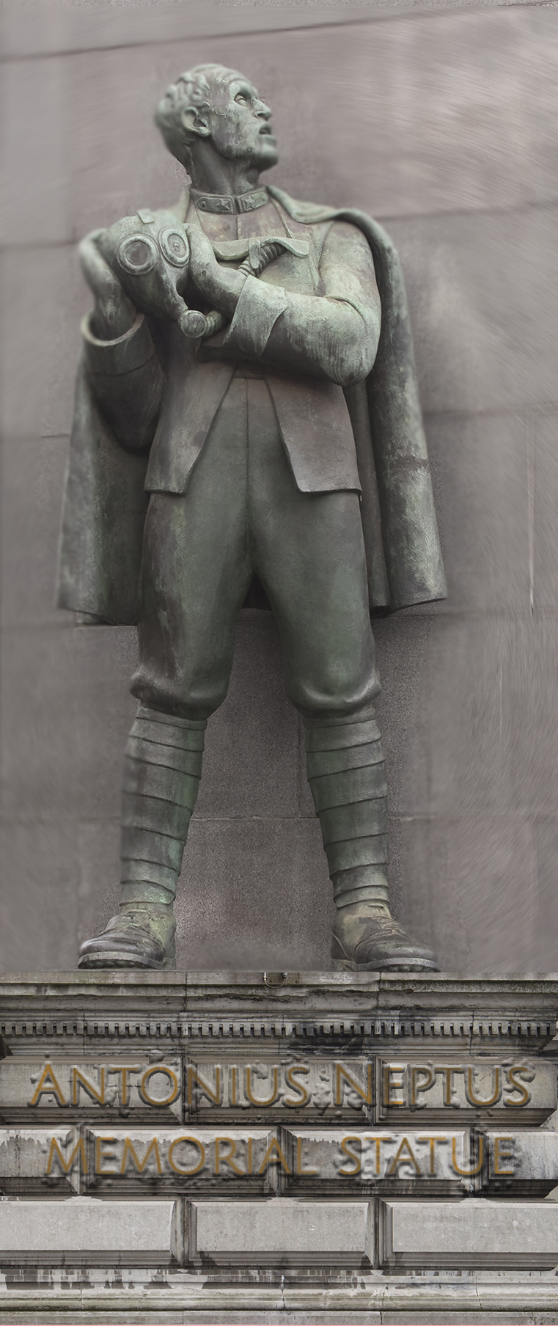 The Great Society thrives on its byzantine labyrinth of bureaucratic and corporate hierarchies. At the top of this pyramid sits the Caretaker’s Office. The High Caretaker stands at the head acting as the voice of both industry and the state. Not quite a dictator, they serve as the masthead around which the people and business cling. However, they do not inspire the cult of personality normally associated with dictators. Rather the office itself holds the power. Underneath the High Caretaker are three Caretakers one dealing with the economy, another the military, and finally social cohesion. All Caretakers have an under-secretary who is responsible for caring out their directives. Underneath them are a whole host of underlings, staffers, and interns. New Caretakers are appointed by sitting Caretakers from the Council of Industry-a highly secretive organization formed from the ranks of leading industries. For example, Personal Protection Supplies, number one in gas mask sales, had four of its last five CEO’s appointed as High Caretaker. But apart from the Caretaker’s Office, there is the Office of Social Safety (OSS) and its euphemistically named Department of Social Happiness (DSH). The OSS is best thought of like the East German Staatssicherheit or Stasi. Responsible for preventing foreign political influences which could unsettle the “tranquility” of the Great Society, the OSS employs legions of informants, spooks, inspectors, and “operatives” to keep an eye on everyone and everything. The DSH may be the soft end of the OSS stick, but with so many eyes watching you, no one knows who is and isn’t on the state dole. More offices and departments exists, but these are the ones that most directly impact Evelyn and her journey.
The Great Society thrives on its byzantine labyrinth of bureaucratic and corporate hierarchies. At the top of this pyramid sits the Caretaker’s Office. The High Caretaker stands at the head acting as the voice of both industry and the state. Not quite a dictator, they serve as the masthead around which the people and business cling. However, they do not inspire the cult of personality normally associated with dictators. Rather the office itself holds the power. Underneath the High Caretaker are three Caretakers one dealing with the economy, another the military, and finally social cohesion. All Caretakers have an under-secretary who is responsible for caring out their directives. Underneath them are a whole host of underlings, staffers, and interns. New Caretakers are appointed by sitting Caretakers from the Council of Industry-a highly secretive organization formed from the ranks of leading industries. For example, Personal Protection Supplies, number one in gas mask sales, had four of its last five CEO’s appointed as High Caretaker. But apart from the Caretaker’s Office, there is the Office of Social Safety (OSS) and its euphemistically named Department of Social Happiness (DSH). The OSS is best thought of like the East German Staatssicherheit or Stasi. Responsible for preventing foreign political influences which could unsettle the “tranquility” of the Great Society, the OSS employs legions of informants, spooks, inspectors, and “operatives” to keep an eye on everyone and everything. The DSH may be the soft end of the OSS stick, but with so many eyes watching you, no one knows who is and isn’t on the state dole. More offices and departments exists, but these are the ones that most directly impact Evelyn and her journey.
What about class systems and social hierarchies?
The Great Society is rigidly separated by class. Living above ground are the citizens with 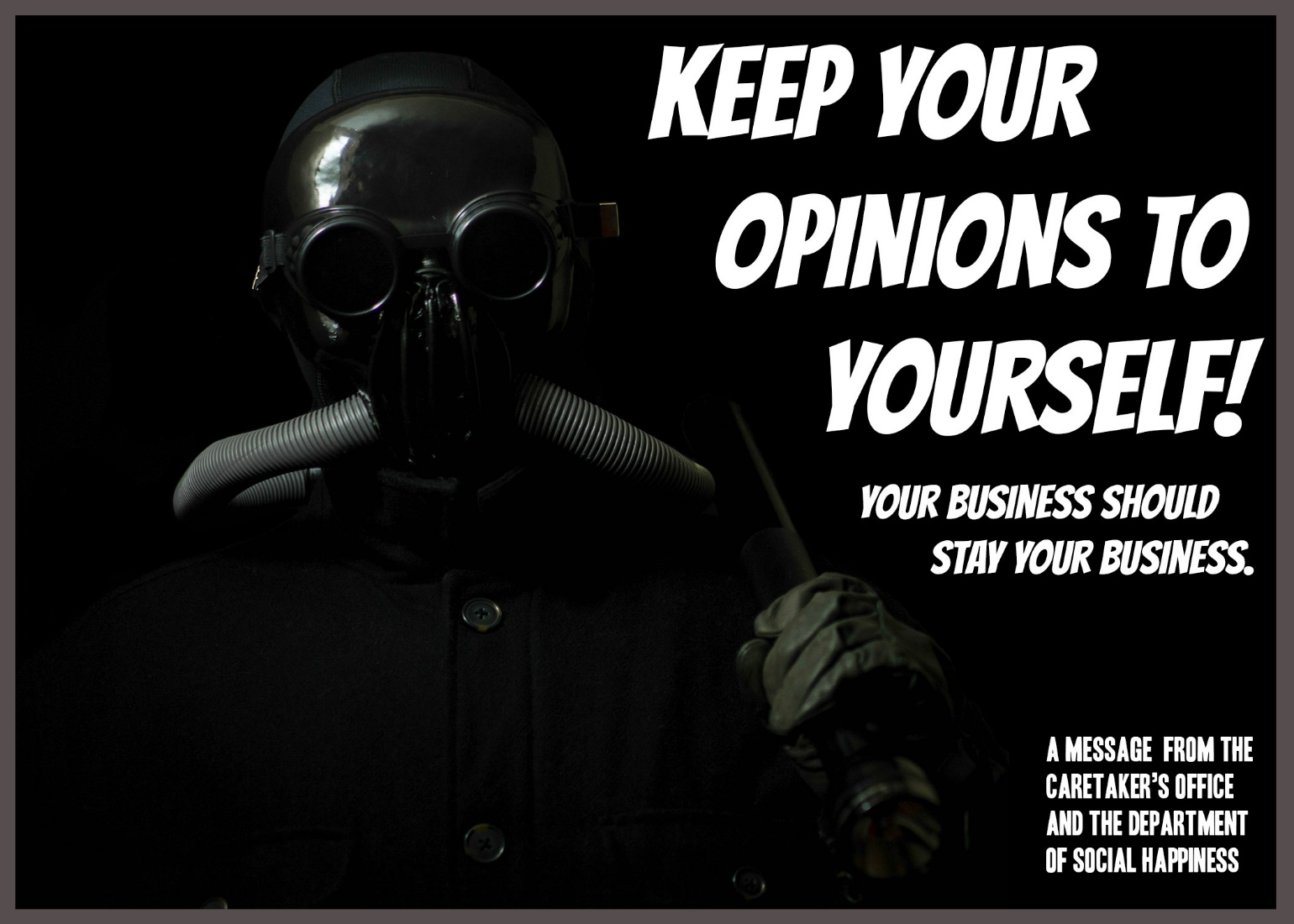 strong party loyalty. They often work in industry as managers, or in the bureaucracy of the Caretakers. However, despite sharing a similar lifestyle of affluence and relative comfort, people are atomized by their masks, their own personal struggles, and their individual homes and televisions. There is little community or shared struggle; they suffer the propaganda, the soot, the corruption, silently and alone. On the other end of the spectrum is the majority. Some live in squalor in rooms tucked into the first and second floors of skyscrapers, but most live in the Undercity. The Undercity is a dark and cramped world hidden under concrete and roads to keep the workers, the service providers, the poor, out of the sight of the Great Society. Their living conditions, and maltreatment at the hands of Peace Officers, has bonded the workers of the Undercity into tight-knit community. But with daily issues and burdens that press more urgently than revolution, anger turns to resentment, to apathy. Others try and escape by joining the ranks of the Peace Officers or Guardians. Great love and immense hate brew for the Great Society in the dark, choking corridors of the Undercity.
strong party loyalty. They often work in industry as managers, or in the bureaucracy of the Caretakers. However, despite sharing a similar lifestyle of affluence and relative comfort, people are atomized by their masks, their own personal struggles, and their individual homes and televisions. There is little community or shared struggle; they suffer the propaganda, the soot, the corruption, silently and alone. On the other end of the spectrum is the majority. Some live in squalor in rooms tucked into the first and second floors of skyscrapers, but most live in the Undercity. The Undercity is a dark and cramped world hidden under concrete and roads to keep the workers, the service providers, the poor, out of the sight of the Great Society. Their living conditions, and maltreatment at the hands of Peace Officers, has bonded the workers of the Undercity into tight-knit community. But with daily issues and burdens that press more urgently than revolution, anger turns to resentment, to apathy. Others try and escape by joining the ranks of the Peace Officers or Guardians. Great love and immense hate brew for the Great Society in the dark, choking corridors of the Undercity.
Want to know more about G.K. Lamb’s world? You can enter it by ordering a copy of his book, Filtered.
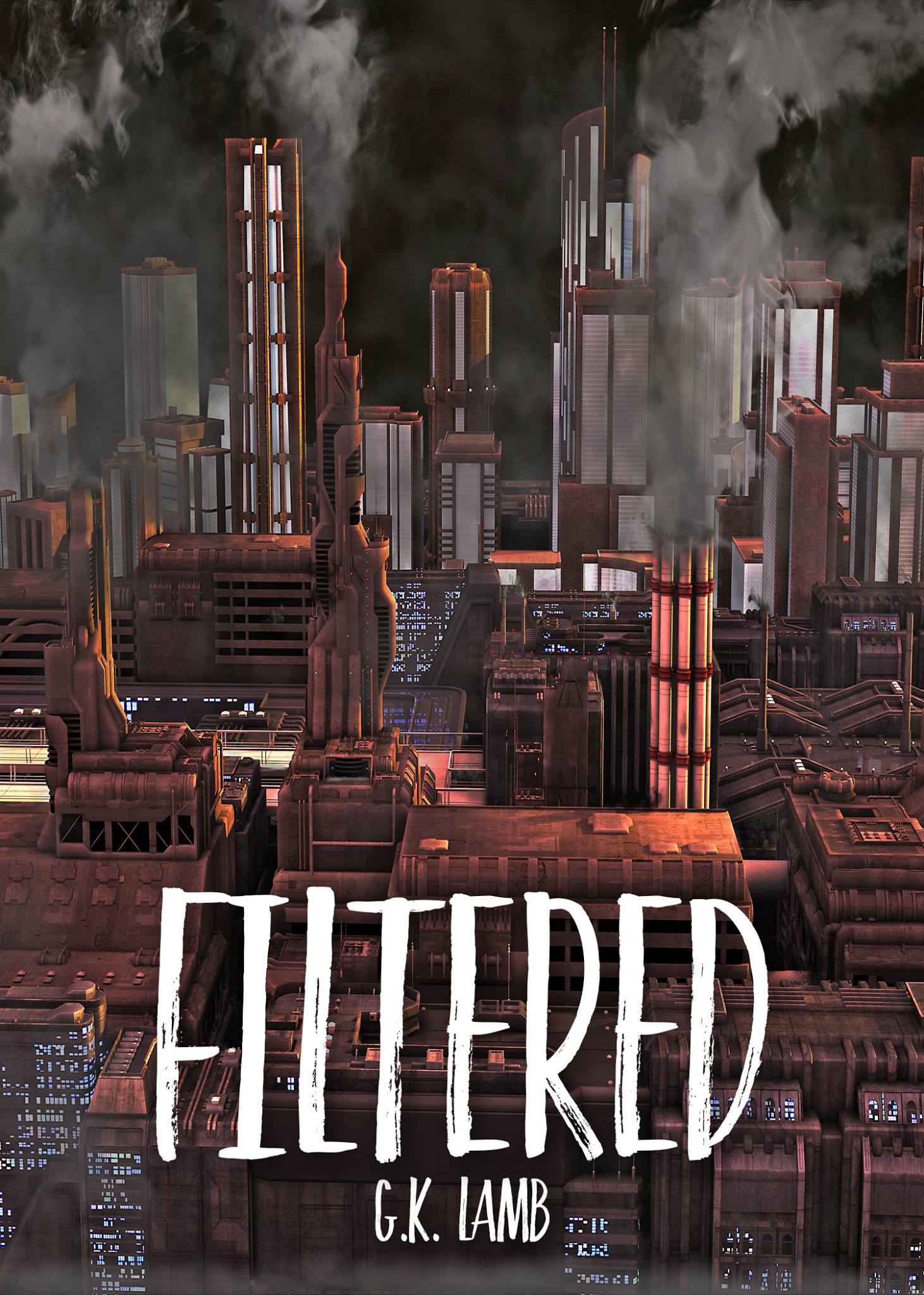 Evelyn Brennan, the 17-year-old protagonist, is on a journey to discover exactly what the Great Society is hiding. Determined to find the truth, she begins to challenge the status quo of her regimented life. Disregarding new filters and venturing into parts of the city she has never been, Evelyn probes the boundaries of the Great Society. Trusting in new-found allies, she finds herself entangled in a brewing revolution – her entire world, and her very identity, are called into question. Pressing on, even as her own world unravels, she ventures into the unknown and unlocks the secrets held within a mysterious device hidden deep beneath the city.
Evelyn Brennan, the 17-year-old protagonist, is on a journey to discover exactly what the Great Society is hiding. Determined to find the truth, she begins to challenge the status quo of her regimented life. Disregarding new filters and venturing into parts of the city she has never been, Evelyn probes the boundaries of the Great Society. Trusting in new-found allies, she finds herself entangled in a brewing revolution – her entire world, and her very identity, are called into question. Pressing on, even as her own world unravels, she ventures into the unknown and unlocks the secrets held within a mysterious device hidden deep beneath the city.
“Is this the next Hunger Games?”
— Dr. Frank Gaskill
— Christine Davis
“Great dystopian novel! 9/10!”
— NayaReadsandSmiles
Excerpt:
The music, muted from behind the door, hits me with its full voice and vigor as I step across the threshold. There is no air lock. It is a moment before that sinks in. As I begin to try and figure out what that means, I realize the people dancing are mask-less. Eyes closed, the throng of people jump and thrash about wildly. Sweat beads on their skin as they press together in an organic, undulating mass. Nevertheless, they do not appear to be rhythmic or orderly, but syncopated and chaotically individual. Their clothes, too, are not the trench coats, stained black from daily use, but bright, revealing clothing. It is close, hot, and uncomfortably alien to me, but I cannot leave. This is worlds away from home and exactly what I wanted.
Pushing through the dancing bodies, I work my way toward the back. Every footfall is labored with the suction of the sticky floor. Pressing deeper and deeper in, I feel awash in a sea of music, light, heat, and humanity.
I spot a bar to my right serving drinks of every color into tall thick glasses, undoubtedly the culprit for the sticky floors. I continue on. Pressing deeper, I emerge from the pack and find, against the back wall, a row of empty tables. It seems everyone is dancing and no one feels like sitting.
Sitting at a table in the corner, I take a moment to better survey the room. Across from the dark wood bar is a stage lit up in bright orange lights. A man stands behind a musical input device, the likes of which I’ve never seen before. His fingers sweep, dodge, and weave through the projected light and I immediately recognize its connection with the ebb and flow of the rhythms within the music. I close my eyes and let it wash over me. I sway silently, letting the beat drift me away.
The tranquil blissfulness is disturbingly interrupted with the forceful sting of my mask being ripped from my face. Panic pulls me back into reality and I clutch at my mouth and nose in a pathetic attempt to keep the poisons out. A pungent aroma of alcohol, sugar, and sweat overwhelms my nose. I know I should have nothing to fear, all these people are dancing wildly, gulping deep breaths of air, but I’m so conditioned against the idea of breathing in buildings without an air lock that my hands remain over my mouth. Turning around to see who pulled off my mask, I come face to face with a woman not much older than myself. She is striking and her eyes burn with the reflected orange light from the stage.
“If you’re going to try and fit in here you might want to at least look the part.”
She practically shouts to make herself heard over the thundering noise of the music.
“But there’s no air lock.” They are the only words I can think to reply and I immediately regret them.
The woman tilts her head back and roars with laughter.
“You are definitely not from around here. How old are you? I bet you’re still in school.”
“Neptus Memorial. I only have a few months left before graduation.”
Her face turns up in amused understanding.
“Rich kid. I don’t think mommy and daddy would like to find out that you’ve been hanging around a place like this.”
“My parents don’t care what I do.”
“Tell them you’ve been here and I’m sure you won’t have that smug look on your face.”
I notice my smirk and drop it from my face. As we shouted to hear each other, the conversation escalated faster than I think either of us intended.
The woman takes a deep breath and relaxes the tense look on her face.
“I’m sorry kid, what’s your name?”
“Evelyn. Evelyn Brennen. And you are?”
Her face lights up with a smile.
“Delia. Pleasure to meet you, Evelyn.”
She extends her hand toward me. I pull the glove off of my right hand and grasp her hand, firmly shaking it. We release hands and the music overtakes the silence growing between us.
“If you want to talk, there is a quieter place.”
“Sure,” I reply.
Standing up as I speak, I follow her out of the dancehall through a door that I didn’t notice on the way in. As I close the door behind me, the music muffles and I can hear my thoughts again. I follow her farther into the room looking around at the walls. They are draped in bright fabrics. Covering the floor are similarly bright carpets dotted by pillows of assorted sizes and wild patterns. Taking us to the back, toward a particularly large and comfortable looking set of pillows, she plops down and beckons me to do the same on the one across from her. She turns my mask over and over in her hands.
I fall onto the pillow. It wraps around me in a soft embrace. I relax for a moment then realize I still have my filthy overcoat on. Hastily I unbutton it and pull it off. Standing back up, I look at the now soiled pillow.
“Don’t worry about it kid, happens all the time.”
Sighing, I sit back down onto the pillow.
“It’s just so beautiful. I’ve never been any place like this or seen…” My words trail off as my mind struggles to take in the radical vibrancy of the room.
“I figured as much. I was much the same way the first time I ventured off the beaten path.”
“I just can’t fit the two places together. The streets above and this place here are as different as night and day. There’s life here.”
“Uncomfortable, isn’t it?”
“It’s overwhelming.”
“It gets better, but you’ll always have that nagging doubt that this place is wrong. That it shouldn’t be.”
“But it should—it has to be.” I reply. The passion in my voice startles me.
Delia smiles. “Agreed. But sadly that’s just not the way things are.”
I pause for a moment. The way things are. The Caretakers, our Great Society. Regimented, isolated, dark, terrifying. “But why?” I reply. My words sound pathetic, but I feel their meaning deeply.
Delia’s face stiffens. “Maybe we should change the subject. How did you find this place?” Her tone is more somber and serious than before.
“I was wandering around and heard the music. I followed it down here.”
“Wait, you weren’t invited? You could hear it on the street?”
Delia jumps up from the pillow with alarming speed and dashes back through the door. For a moment, the volume rises, then recedes as the door slams shut. Instinctively, I stand and begin to put my overcoat back on. The muffled music stops. As I finish the top button, Delia returns. She hurls my mask at me. I catch it, stinging my hands.
“Come on. We need to get out of here. Follow me.”
She breaks into a run back toward the dance floor. I don’t hesitate and quickly catch up. Following closely behind her, we press through the frantic swarm of people making it for the door. I fight not to lose sight of her vibrant green shirt.
The front door is swung wide open from people mashing against each other to get out. The atmosphere, so inviting before, is now electric with terror. Seeing the open door, and the falling ash outside, my heart sinks.
With trembling hands, I haphazardly pull on my mask. My hair snags painfully on the rubber straps. Shaking, I’m overrun with fear. I don’t know what’s happening.
As I begin to shut down, a hand firmly grasps my hand and pulls me toward the exit.
“Come on, Evelyn!”
Delia’s voice is clearly audible over the panicked murmur of the crowd. Coming into the doorway, I am pressed from all sides and struggle to remain standing. Clawing hands and pressing bodies send waves of pain rippling through my body, but I don’t let go of Delia’s grip. I struggle until I’m free.
We race up the stairs with reckless haste, keeping each other from falling with our hands’ death grip on the other’s. At the top of the stairs, Delia leads us straight into the street. The automobiles there are at a full stop.
Weaving, sliding, and jumping we pass through the congested street. The motorists honk angrily. I keep my eyes fixed on her shirt to guide me through the sea of grey and black.
Emerging from the traffic jam, we dart into the first alley. The sound of sirens begins to echo in the claustrophobic space.
“Keep moving; we need to keep moving.”
Delia leads us through the confusing maze of alleys. Darting left and right into connecting branches, we quickly lose sight of the street and rapidly increase the distance between us and the rising roar of sirens.
My lungs burn from the effort. Outside of the gym there is little place to sprint, and I have never done it in my mask. My strained, carbonized breaths feed a growing feeling that I’m going to hyperventilate, but Delia’s unrelenting speed propels me forward and strengthens my resolve.
Mercifully, a few yards ahead, Delia leads us to the left and into a small blind alley which is partly obscured by a dumpster. She releases my hand. Blood and sensation rush back into it. It throbs a little. I fight to catch my breath with the short gulps the mask allows me. Delia presses her back to the wall and slides to the ground. From a small pouch on her waist she pulls out a gasmask and places it over her face.
“Are you ok? Do we need to get you to a hospital?” I say panicked. I have never seen anyone outside without their mask. You’ll die. It’s that simple. Or at least it was until a few moments ago.
“No, I’m ok. Plus I can’t be seen right now. I’m a dead giveaway in this green shirt.”
Delia looks down at her green shirt steadily turning black in the falling ash.
“What now?” I ask.
“I need to wait until dark before I can get out of here. And you need to get home. Your parents are going to be worried.”
“They don’t worry about me,” I say indignantly. My resentment toward their fight last night clearly shines through.
“You know that’s not true. Plus, with all the Peace Officers swarming around you definitely don’t want to be here.”
“But I can’t go. Your mask, I mean you didn’t need a mask. You know things. Things I want to know. I need to know the truth.”
Delia lifts her head locking her eyes with mine.
“That’s a dangerous path kid. You think you want to know, you think you’re ready, but you’re not. You should go home and forget everything you saw.”
“Impossible,” I say.
Delia’s head drops. “I know.” The sorrow in her voice sends a shiver down my spine.
“If you want to learn more,” she continues, “ask yourself this. Why have you never seen someone die on the street? Where are the corpses of rats and birds? Once you’ve started to peel those layers back ask yourself, what’s hidden in the silver trucks?”
I gulp hard. Fear radiates in my body. Silver trucks? What is she talking about? With every passing moment more of the world is revealed to me, yet I can’t shake the feeling that I understand it less and less.
“Where do I even start? Can’t you tell me?”
“I wish I could kid, but this is one journey you have to make by yourself.” She pauses for a moment. Taking in a deep breath she continues, “Blend in, cover your tracks and don’t make waves.”
Her warning sinks home. Peace Officers don’t take kindly to abnormal behavior. It’s beat out of us at school to the point where it becomes unimaginable. I care not to think about what happens to the people who cut their own path.
Delia pushes herself up from the filthy alley floor. The conversation dies. Only the movement of falling ash breaks up the stillness. Delia looks exhausted. Not from the sprint, but from being on the run. The woman who approached me in the club is gone. Her vibrancy has faded, her face now stoic in resolve. I imagine, for a moment, that I’m looking at my future self. The thought sinks into the pit of my stomach. Delia locks eyes with me. I see something there, familiar, yet I cannot express it. Like the look my mother gave me all those years ago, this too will haunt me. She turns away from me and begins taking long strides down the alley. I panic; she can’t leave yet. This has been too much too quickly, and I still have so many questions.
“Where are you going?” More of my anxiety seeps into my words than I would like.
“I don’t know, kid. Now go on, get home. And remember, tread carefully.”
I stand frozen as I watch her turn the corner and disappear. Minutes ago I didn’t know her world existed and now it’s slipping away from me. I think of crying out to her, but decide better of it. But the gnawing remains. If I let her get away now, I may never find the answers I seek. Forcing my muscles to move, I run after her as fast as the slippery cobblestones will allow.
The alley forks and diverges. I pick paths on impulse, then double back when they, too, turn up empty. My lungs rasping, mouth tasting of copper and ash, I slow down to a walk. Tears well in my eyes. I found what I was looking for, I found her, and I let her slip away. Sliding down the wall behind me, the adrenaline fades away and my heart slows. Heavy tears stream down my face, pooling in the inner seal around my eyes obscuring my view. Slowly, I pull all the emotions this encounter unleashed back into place and rise from the cold, stone alley.
I wind my way back to the main street. Instantly, I slip into the crowd and disappear. As I walk, I know that I’ll never see Delia again and that my life will never be the same. Sadness and eagerness fight in my heart.
Buy the book!
EBOOK: Amazon
PRINT BOOK: Hero House Publishing
Connect with G.K. Lamb in the following places!
Website: G.K. Lamb
Twitter: @gklamb103
Facebook: G.K. Lamb
Email: gklamb103 “at” gmail “dot” com

